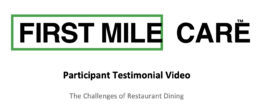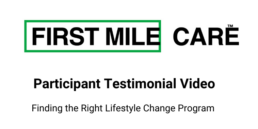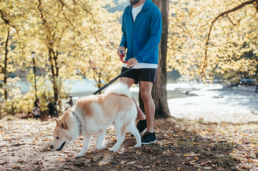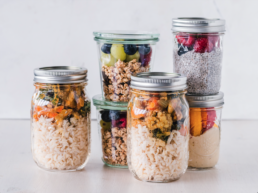By Juliana Ronn, First Mile Care Director of Operations
Deborah Wilson joined the year-long First Mile Care Diabetes Prevention Program in April 2022. She agreed to talk about why she joined, the results she has seen, and her tips for leading a healthier lifestyle. Deborah is a retired 58-year-old living in Detroit, Michigan who spent her career working with special needs children.
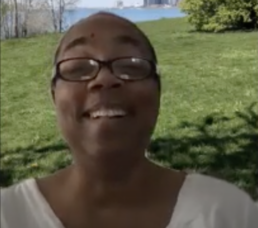
1) What was your biggest health-related problem before joining the First Mile Care Diabetes Prevention Program?
My weight had been fluctuating up and down for about a year and a half. Since I’m vegetarian, I found it difficult to figure out how to eat. I confided in my doctor, Dr. Sarala Vunnam at Henry Ford Health Systems, and told her I needed to see a nutritionist. That’s when she told me about First Mile Care. I didn’t want my health to go from bad to worse and I didn’t want to go on a “diet.” I wanted professional help with lifestyle change to figure out what was right for me.
2) Now that you’re finishing the program, how do you feel about your eating habits?
Along with being vegetarian, one of my biggest challenges was a lack of appetite. I would go all day not eating because I didn’t have a big appetite. Coach Gray Jessiman encouraged me to take pictures of when I was able to eat a balanced meal so that it would motivate me to eat. For meals, I make my plate bright with pretty colors and that motivated me the most. I make sure vegetables take up half the plate to make the times I do eat big meals really count, to provide the energy I need. When I don’t feel like eating, I make a smoothie because I know that will satisfy me. It was all about finding ways to eat that worked for me.
I love to snack on nuts but can unknowingly eat a whole bag in one sitting. Becoming aware of correct portion sizes by preparing snacks in containers was a really helpful tip from Coach Gray. I even use a smaller plate when I’m fixing meals to avoid overeating, so I’m much more conscious about how I prepare my plate overall.
3) Did you know what prediabetes was before First Mile Care?
Yes, I had first-hand experience with type 2 diabetes as my father went into a diabetic coma and never came out. So I was quite aware of what diabetes was all about and that has made me very adamant about monitoring my own health. While I don’t exactly know if I had a prediabetes diagnosis before joining the program, I knew I was at risk for diabetes due to my family history, so I needed to learn how to maintain a healthy weight and avoid developing bad habits. It wasn’t that I was overweight, I just wasn’t at a weight that was comfortable for me and I knew what I wanted for myself because I’d seen my father pass away.
4) What measurable changes have you seen since completing the program?
I joined the program at 159 lbs. My tests showed that everything was fine but my whole life I had been 20 lbs lighter and I had noticed post-menopausal weight gain. With my familial experience with type 2 diabetes, I didn’t feel comfortable at that weight and knew I needed a change.
Now that I’m finishing the program, I’m between 147 and 150 lbs which I am very happy with. I’m still working on getting to 139 lbs, but when I went to check-in with Dr. Vunnam this year, all of my tests came back great! So, yes, through changing my diet and reducing my weight, I feel successful in preventing diabetes.
5) What did you most enjoy about the First Mile Care program?
I liked working with Coach Gray because she understood me and she was great at personalizing the program for me. It was helpful to have one-to-one support to get her input on food labels and she provided recommendations if I should buy a product or not. If I needed extra help, she had lots of ideas and recipes to try but I never felt any pressure. She let me make my own choices. It all boiled down to figuring out a way for me to eat food that would align with my goals and she helped me figure it out.
6) What role did your coach play in your success?
Coach Gray really customized the program for me, my goals, and my health situation. In 2009, I received a diagnosis for a rare muscle disease that kept me in a wheelchair for several years. It’s a disease only 1% of the population has so, in terms of a solution, the doctors don’t know how to treat me. Through determination and the support of my family, I’ve been able to move without a cane or a walker for a few years now. My muscle disease aside, I also experience hip pain at times.
Being able to understand my triggers is what has kept me out of the wheelchair. Now that I’ve mastered my eating, including movement in my lifestyle is key. If I go on a walk, I make sure to listen to my body and take short breaks. Before the pandemic, I was going to the gym once or twice a week and my goal was to try to walk 10,000 steps daily. Now, I spend hours gardening and I’m getting 7,000 or 8,000 steps every day just through growing tomatoes (I have 15 different types!), green beans, strawberries, peas, watermelon, cantaloupe, squash, cucumbers, bell peppers, and lemon peppers.
Coach Gray knows my challenges and was the one who told me that, with my disease, I should be careful about eating too many tomatoes or bell peppers. That was something I didn’t know but I’m a tomato lover! I am so determined this won’t just be a year-long program but a full, permanent lifestyle change for me. It was just those little personal things that my coach recommended that have made all the difference for me in being able to sustain my new habits.
7) Was it helpful to have people in the same geographic area as you embarking on lifestyle change?
Yes! The majority of my group was based around the east side of Detroit, and in our weekly discussions it was helpful to chat about which local stores people could find different ingredients, like monk fruit, and being able to strategize with your group about where to find specific ingredients or produce. It helped us to relate to each other by providing another level of support.
8) Did you find a food journal or another type of tool to be helpful?
I kept a food journal in the beginning and then stopped once I had developed the eating habits that worked for me. Right now, I’m on a salmon kick where I’ll eat salmon, corn, and broccoli for about a month straight, and journaling helped to build that habit. We also built action plans about eating and exercising that I try to follow when I can. However, because of my physical challenges, sometimes I’m in too much pain to walk so I just have to listen to my body and do what feels right.
9) Did you learn something that was surprising from the program?
I learned that walking 10 minutes after you eat is a good way to burn more sugar. Coach Gray also recommended eating my food, waiting, and then drinking water after eating, to avoid slowing my digestive system. Lastly, I’m very good at reading food labels now and learning that if you can’t pronounce it, don’t eat it!
10) Do you think you’ll be able to maintain these habits after the program?
Absolutely. The only challenge has been learning how to eat out at restaurants. I know what to order but sometimes the meals will come with sides where I don’t know the ingredients or the calorie count. I learned that my solution is to just eat around it.
Everything I learned from First Mile Care I live by and I tell people about it. Sure, sometimes I’ll have my cheat days but I’m much more aware of a lot of my habits. I do tell a lot of people about what I’ve learned because when I teach other people, it sticks with me. I’m very adamant about keeping my weight down and now it’s a lifestyle, so it will be very natural to maintain these habits.
To learn more about how you can benefit from the First Mile Care Diabetes Prevention Program, take the prediabetes risk test and get started today!


